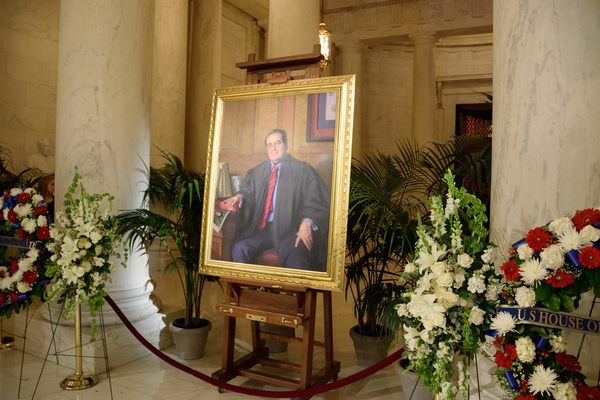When renowned Supreme Court Justice, then-law professor Antonin Scalia defended an Article V convention for proposing amendments during a 1979 panel discussion, he encountered many of the same opposing arguments a Convention of States supporter might encounter today.
His fellow panelists raised many exaggerated concerns about what might come out of the convention, which all members of the panel inaccurately called a constitutional convention.
“Professor Scalia,” one member addressed the future member of SCOTUS, “Richard Rovere in the New Yorker, suggested that the convention method. . . might reinstate segregation and even slavery, throw out much or all of the Bill of Rights, eliminate the Fourteenth Amendment's due process clause, reverse any Supreme Court decision the members didn't like, and perhaps for good measure, eliminate the Supreme Court, itself. Now, what would you anticipate from an unlimited convention?"
It’s worth noting that the question specifically concerns an “unlimited convention.” Our convention would be limited, as members could only discuss amendments that would limit the power and jurisdiction of the federal government, impose fiscal restraints, and place term limits on federal officials. Scalia reminds his questioner that his overstated misgivings about what a convention might enact could also come out of Congress (which is not limited as our convention would be) as Article V grants both Congress and the states the power to propose amendments.
“All those things are possible, I suppose, just as it is possible that the Congress tomorrow might pass a law abolishing social security as of the next day, or eliminating Christmas,” Scalia responded satirically. “Such things are possible, remotely possible. I have no fear that such extreme proposals would come out of a constitutional convention. Surely, whether that risk is sufficient to cause anyone to be opposed to a constitutional convention depends on how high we think the risk is and how necessary we think the convention is. If we thought the Congress were not necessary for any other purpose, the risk that it might abolish social security would probably be enough to tell its members to go home.” [emphasis added]
“So, it really comes down to whether we think a. . . convention is necessary. I think it is necessary for some purposes, and I am willing to accept what seems to me a minimal risk of intemperate action. The founders inserted this alternative method of obtaining constitutional amendments because they knew the Congress would be unwilling to give attention to many issues the people are concerned with, particularly those involving restrictions on the federal government's own power. The founders foresaw that and they provided the convention as a remedy. If the only way to get that convention is to take this minimal risk, then it is a reasonable one.”
Scalia wisely points out that any revision opponents fear may come out of a convention could also be made at any point by Congress and is actually more likely to be made by Congress seeing that it is out of touch with the will of the American people.
Take, for example, an anti-second amendment proposal. This would fall outside of the Convention of States’ application’s limited subject matter and would therefore be off the table at a convention. Congress, however, can propose an amendment overturning our right to keep and bear arms whenever it pleases. If we were genuinely concerned about protecting that right, we would work to stop Congress, not Convention of States.
"The Constitution has been changed, whether we have liked it or not, during the last 200 years, and not merely by the ratification process,” Scalia points out. “Many of the decisions of the Supreme Court have made fundamental alterations without giving us any opportunity to say whether we liked them. So it is not a matter of whether we leave the Constitution untouched, but whether we prevent somebody else from touching it in a way that we don't want."
Convention of States critics fail to consider that even if some radical amendment happened to make it out of convention (which would be effectively impossible in a limited convention) 38 states would still have to ratify it–an insurmountable hurdle that would stop the rogue amendment in its tracks, leaving it powerless.
Taking all of these factors into consideration it becomes clear that calling a Convention of States does not entail even a “minimal risk.” The process is completely safe and altogether necessary. As Scalia explained, the Founders knew the federal government might one day turn a deaf ear to the American people and they gave us the convention for proposing amendments as a remedy. It’s high time we used it.
To join us in our efforts to call an Article V Convention of States, sign the petition below!
THROWBACK pt. 2: Antonin Scalia dismisses fears about Convention of States
Published in Blog on September 28, 2022 by Jakob Fay


